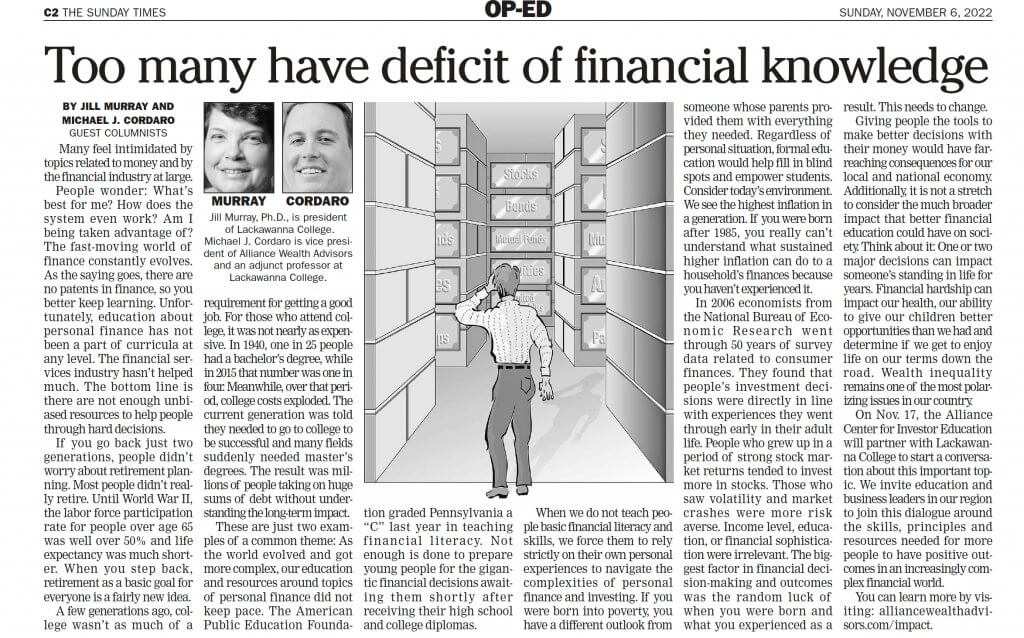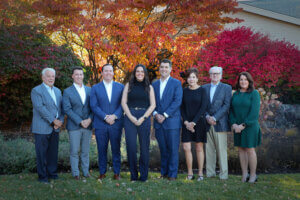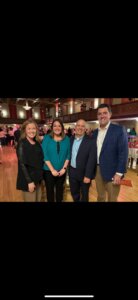
Alliance in the press: The Sunday Times
CommunityNov 10, 2022
On November 17th, The Alliance Center for Investor Education and Lackawanna College will be hosting the first ever Financial Impact Summit. Our goal is to bring business and education leaders together to discuss how people make decisions with their money, and how we can improve outcomes for more people through financial education. Ahead of this event, President of Lackawanna Dr. Jill Murray, and Vice-President at Alliance Michael Cordaro published an article in this weekend’s Sunday Times highlighting the deficit of financial education and the negative impact it can have. We are hoping to start a conversation around the need for educational institutions and employers to come together to improve financial education for their students and employees in an uncertain economic landscape and complex financial world. Please see the full article below!

Many feel intimidated by topics related to money and by the financial industry at large.
People wonder: What’s best for me? How does the system even work? Am I being taken advantage of? The fast-moving world of finance constantly evolves. As the saying goes, there are no patents in finance, so you better keep learning. Unfortunately, education about personal finance has not been a part of curricula at any level. The financial services industry hasn’t helped much. The bottom line is there are not enough unbiased resources to help people through hard decisions.
If you go back just two generations, people didn’t worry about retirement planning. Most people didn’t really retire. Until World War II, the labor force participation rate for people over age 65 was well over 50% and life expectancy was much shorter. When you step back, retirement as a basic goal for everyone is a fairly new idea.
A few generations ago, college wasn’t as much of a requirement for getting a good job. For those who attend college, it was not nearly as expensive. In 1940, one in 25 people had a bachelor’s degree, while in 2015 that number was one in four. Meanwhile, over that period, college costs exploded. The current generation was told they needed to go to college to be successful and many fields suddenly needed master’s degrees. The result was millions of people taking on huge sums of debt without understanding the long-term impact.
These are just two examples of a common theme: As the world evolved and got more complex, our education and resources around topics of personal finance did not keep pace. The American Public Education Foundation graded Pennsylvania a “C” last year in teaching financial literacy. Not enough is done to prepare young people for the gigantic financial decisions awaiting them shortly after receiving their high school and college diplomas.
When we do not teach people basic financial literacy and skills, we force them to rely strictly on their own personal experiences to navigate the complexities of personal finance and investing. If you were born into poverty, you have a different outlook from someone whose parents provided them with everything they needed. Regardless of personal situation, formal education would help fill in blind spots and empower students. Consider today’s environment. We see the highest inflation in a generation. If you were born after 1985, you really can’t understand what sustained higher inflation can do to a household’s finances because you haven’t experienced it.
In 2006 economists from the National Bureau of Economic Research went through 50 years of survey data related to consumer finances. They found that people’s investment decisions were directly in line with experiences they went through early in their adult life. People who grew up in a period of strong stock market returns tended to invest more in stocks. Those who saw volatility and market crashes were more risk averse. Income level, education, or financial sophistication were irrelevant. The biggest factor in financial decision-making and outcomes was the random luck of when you were born and what you experienced as a result. This needs to change.
Giving people the tools to make better decisions with their money would have far-reaching consequences for our local and national economy. Additionally, it is not a stretch to consider the much broader impact that better financial education could have on society. Think about it: One or two major decisions can impact someone’s standing in life for years. Financial hardship can impact our health, our ability to give our children better opportunities than we had and determine if we get to enjoy life on our terms down the road. Wealth inequality remains one of the most polarizing issues in our country.
On Nov. 17, the Alliance Center for Investor Education will partner with Lackawanna College to start a conversation about this important topic. We invite education and business leaders in our region to join this dialogue around the skills, principles and resources needed for more people to have positive outcomes in an increasingly complex financial world.
You can learn more by visiting: alliancewealthadvisors.com/impact.
Financial Impact Summit
Hosted by: The Alliance Center for Investor Education and Lackawanna College
This first of its kind financial education summit is for business owners, industry leaders, and individuals who want to make better decisions with their money. In an increasingly uncertain economic environment, it is vital that people in all stages of life have the tools and information they need to make good choices. Speakers will discuss topics that include: having better frameworks for decision-making, how psychology can impact financial outcomes, and the future of financial education.
Thursday, November 17, 2022
POSH Events
404 North Washington Avenue, Scranton, PA
5:00 pm to 7:00 pm


